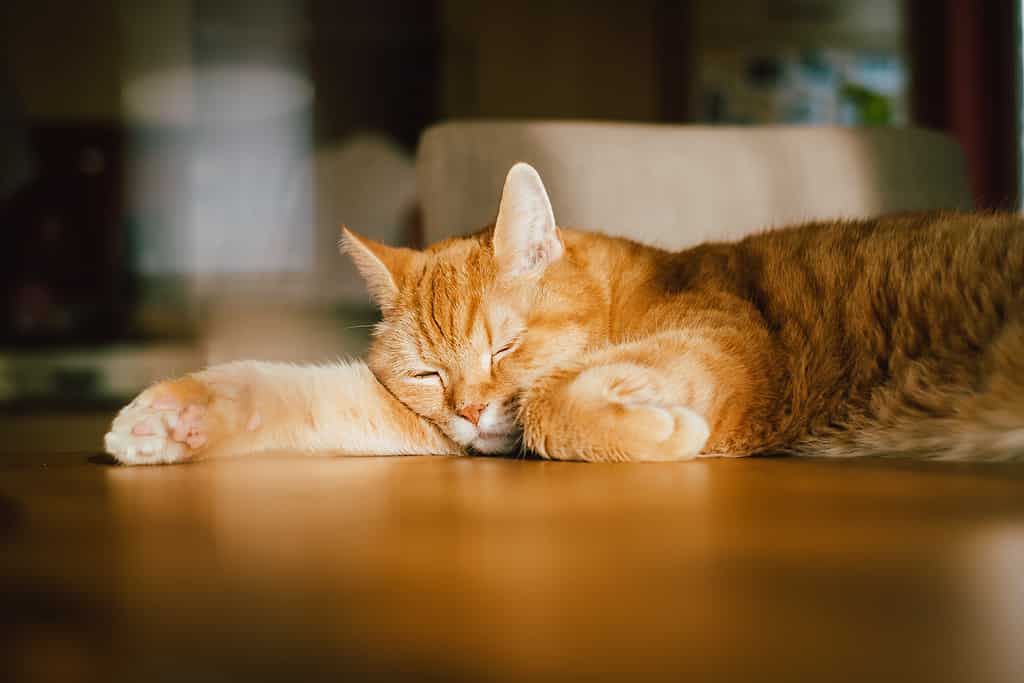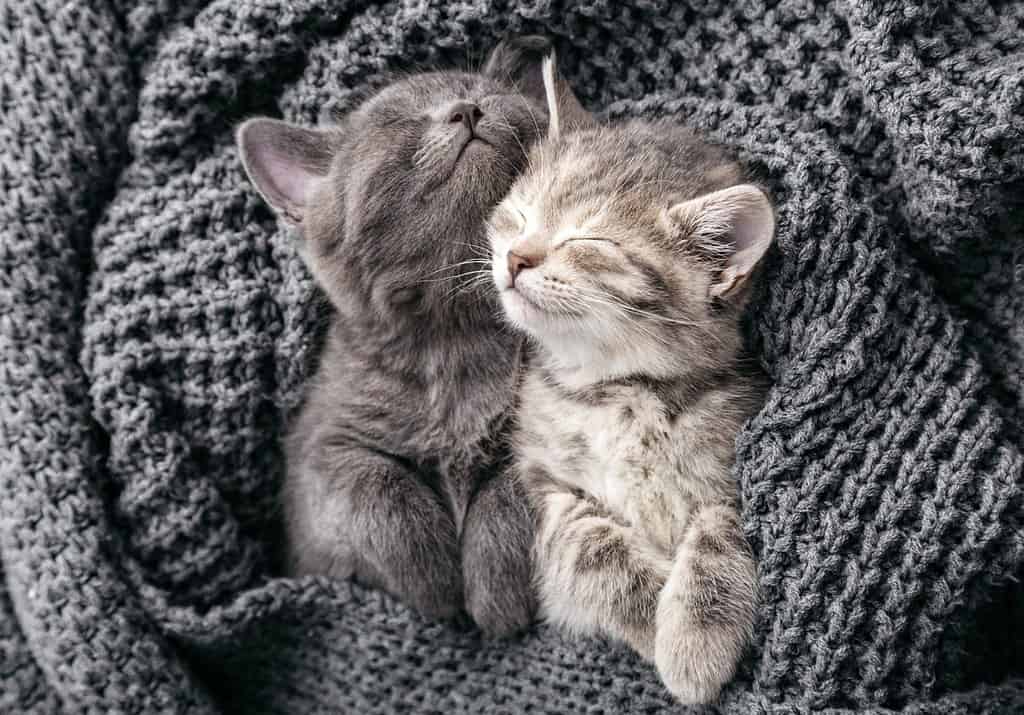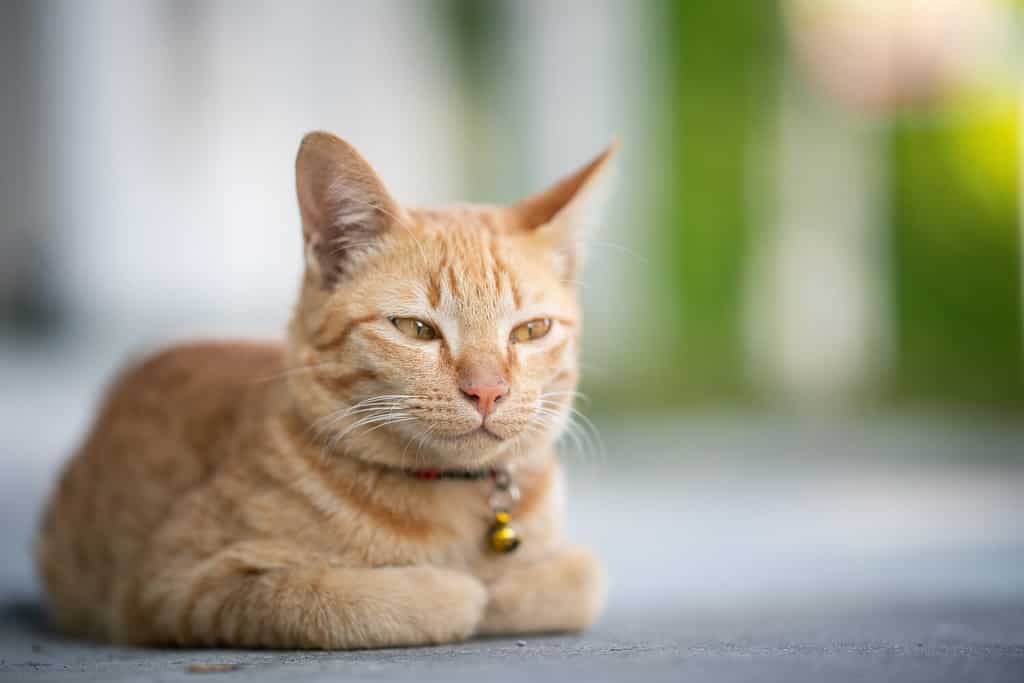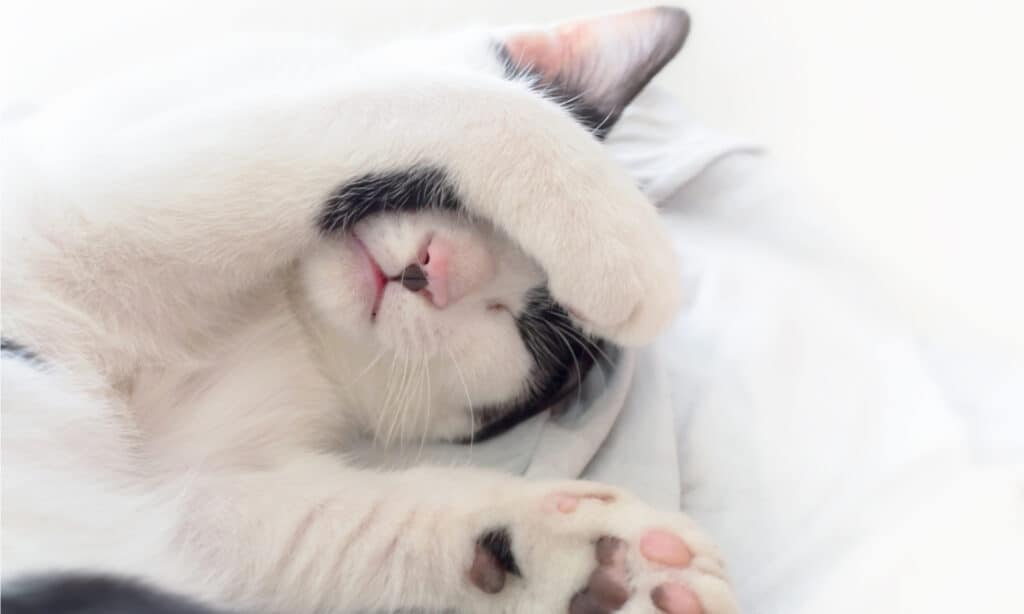If you’ve ever been around a cat, you know that these furry felines sleep a lot. But have you ever wondered how long cats sleep? And why do they sleep so much? Dive in and discover the science behind the original champions of the cat nap!
How Long Do Cats Sleep?

Some cats enjoy sleeping in the sunlight, while others stretch out to cool off.
©Jérémy Stenuit/iStock via Getty Images
Cats typically sleep between 12 to 18 hours each day. As they get older, they will sleep longer, while younger cats tend to sleep less. Cats are crepuscular, which means that they are most active early in the morning and in the evening when the sun sets. Nocturnal animals, on the other hand, are awake at night and asleep during the day, while diurnal animals (like humans), are active during the day and sleep at night. Being crepuscular, however, is a great advantage for cats when it comes to catching their prey. They hunt birds early in the morning and the rodents who head out for their own nocturnal activities around sunset.
How Long Are Feline Cat Naps?

Cats are typically solitary, but many prefer snuggling up with another feline friend.
©beton studio/Shutterstock.com
Like humans, cats experience a multi-phase sleep cycle, complete with rapid eye movement (REM) and possibly even dreams! A human sleep cycle includes four different stages: non-rapid eye movement sleep (NREM), light sleep, deep sleep, and REM, which often is accompanied by vivid dreaming. Cycling through all four stages typically takes around 41 to 132 minutes.
Cats also go through a multi-phase sleep cycle that typically lasts 50 to 113 minutes. They experience an NREM stage, with light wave sleep and deep slow wave sleep. During this stage, they are partially alert and can wake up at a moment’s notice. Cats may wake up after the NREM stage and continue with their day several times rather than passing into the deeper sleep stages. In other words, they can enjoy several smaller “cat naps” throughout the day.
However, if a cat makes it past the NREM sleep stage, they will then enter into REM sleep. Just like with humans, their eyes will move and twitch beneath their eyelids (which is why it is referred to as “rapid eye movement” sleep). You may also notice muscles in their paws, cheeks, or legs twitching as well during this stage. Researchers believe that during REM cats dream, and that these movements may be the cats acting out their dreams.
Why Do Cats Sleep So Much?

Some cats sleep with their eyes partially open so that they are ready for action.
©MBLifestyle/Shutterstock.com
Like any animal (including humans), sleep allows cats to recover and recharge. During sleep, their bodies can rebuild and conserve energy and strengthen their immune systems. In addition, sleep helps with system regulation and memory formation.
Surviving in the wild takes a lot of energy, especially when it comes to securing a meal. Just think about how much energy goes into tracking, stalking, and taking down prey — and not every hunting attempt is successful! So, sleeping allows cats to conserve their much-needed energy and recharge for the next hunt. Many domestic cats may not have to worry too much about their next meal, but the process is still engrained in their DNA.
Cats can also wake up quickly and function remarkably well, even after a long sleep. Whereas many humans struggle to feel “fully awake” before their coffee, cats seem to always be alert. Some cats even fall asleep sitting up or in the iconic “cat loaf” pose. These postures allow them to remain ready so that they can quickly spring into action if needed — a wonderful survival skill when you have to protect yourself in the wild.
When to Worry About Your Cat’s Sleep

Cats often sprawl out when they feel comfortable and safe.
©Gumpanat/Shutterstock.com
As we’ve seen, it is perfectly healthy for a cat to sleep a lot. On occasion, their sleep cycle may briefly change due to an unexpected disruption. For example, if they’ve had a particularly exciting day — such as a full afternoon of playtime or a trip to the vet — they may sleep more than usual to recover. Their sleep schedules may also differ after a change in their environment, such as a new family member, rearranging the furniture, or moving to a new home.
Although most of the time you don’t need to worry, you should pay attention to your cat’s sleeping habits and watch for any changes. Unusual sleep patterns (such as sleeping more or less than usual) could be a sign of an underlying health issue. When cats are sick or injured they often sleep more, and you’ll want to contact your veterinarian right away. In addition, pay attention to any other changes in your cat, such as a change of appetite, weight loss, weight gain, or a change in their behavior. Here are a few examples of issues that can affect your cat’s sleep:
- Hyperthyroidism or Hypothyroidism
- Feline Immunodeficiency Virus (FIV)
- Deafness
- Anaemia
- Stress, anxiety, or boredom
- Gastrointestinal problems
- Depression or pain
- Heart disease
- Kidney disease
- Liver disease
- Diabetes
- Cancer
- Overheating
- Difficulty breathing
The photo featured at the top of this post is © Siarhei SHUNTSIKAU/iStock via Getty Images
Thank you for reading! Have some feedback for us? Contact the AZ Animals editorial team.







